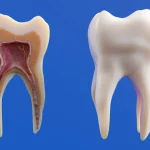The benefits of root canal treatment go far beyond just saving a tooth. This common dental procedure is designed to remove infection, relieve pain, and protect your natural smile. Many people fear root canals, but with modern techniques, they are more comfortable and effective than ever before.
By learning about the advantages, you can feel more confident about your decision to undergo this treatment.
In this article, we will explain what a root canal is, discuss its pros and cons, share tips for preparation and recovery, and show how professional care can make the process simple and stress-free.
What is a Root Canal?
A root canal is a dental procedure that treats the inside of the tooth. When the pulp (the soft tissue inside the tooth containing nerves and blood vessels) becomes infected or damaged, it can cause severe pain and may lead to tooth loss if untreated.
The dentist removes the infected pulp, cleans the inside, and seals the tooth to prevent future issues. This treatment preserves the tooth structure and restores normal function.
Key Benefits of Root Canal Treatment
Here are the main benefits of root canal treatment that make it a preferred choice for many patients:
1. Saves the Natural Tooth
- Preserves your natural smile and bite.
- Avoids the need for tooth extraction or replacement.
- Helps maintain jawbone strength and alignment.
2. Pain Relief with a Painless Root Canal
- Advances in dental technology ensure a painless root canal experience.
- Modern anesthesia and techniques reduce discomfort.
- Pain after treatment is minimal and manageable.
3. Prevents the Spread of Infection
- Removing infected pulp stops bacteria from spreading to other teeth or the jawbone.
- Reduces the risk of abscess formation.
- Promotes long-term oral health.
4. Cost-Effective and Long-Lasting
- More affordable than extracting and replacing a tooth.
- Treated teeth can last a lifetime with proper care.
- Saves money on future dental procedures.
5. Improves Oral and Overall Health
- A healthy mouth contributes to overall wellness.
- Eliminating infection lowers the risks of other health complications.
- Enhances confidence in your smile and daily life.
Root Canal Experience: What to Expect
Many patients wonder what a root canal experience is really like. Here’s what typically happens:
- Consultation: The dentist examines your tooth and takes X-rays.
- Numbing the Area: Local anesthesia ensures you feel no pain.
- Cleaning and Sealing: The infected pulp is removed, and the tooth is sealed.
- Crown Placement: Often, a crown is added for protection and strength.
With skilled care, the process is smooth and efficient.
Root Canal Removal Benefits
Sometimes, a tooth treated with a root canal may still need removal due to damage or reinfection. Here are some root canal removal benefits:
- Eliminates ongoing pain from a failing tooth.
- Prevents complications from untreated infection.
- Allows for replacement options like implants or bridges for improved function.
Pros and Cons of Root Canal Treatment
Like any dental procedure, there are pros and cons of root canal treatment:
Pros:
- Saves your natural tooth.
- Relieves pain quickly.
- Prevents further oral health problems.
Cons:
- May require multiple visits.
- Some mild soreness or sensitivity afterward.
- In rare cases, re-treatment may be needed.
Overall, the pros far outweigh the cons for most patients.
Are Root Canals Good for You?
Many patients ask, Are root canals good for you? The answer is yes. They are a safe and effective way to treat an infected or damaged tooth. By preserving your natural tooth, you maintain oral health, improve function, and boost confidence. Discussing your specific case with your dentist will help you make the best choice.
How to Prepare for a Root Canal
How do I prepare for root canal treatment? Here are simple steps:
- Eat a light meal before your appointment (unless advised otherwise).
- Take any prescribed medications.
- Arrange for a ride if sedation is used.
- Stay relaxed and ask your dentist questions to ease anxiety.
Preparation helps make the process easier and stress-free.
Root Canal Down Time: Recovery and Care
The root canal downtime is usually minimal. Most patients return to normal activities the next day. Here’s what to keep in mind:
- Mild soreness is common for a few days.
- Avoid chewing on the treated tooth until fully restored.
- Follow any care instructions given by your dentist.
Proper care speeds up healing and protects your tooth.
Signs of Infection After Root Canal
It’s rare, but sometimes complications occur. Watch for these signs of infection after a root canal:
- Persistent or increasing pain.
- Swelling in the gums or face.
- Discharge or a bad taste in the mouth.
- Fever or feeling unwell.
Contact your dentist immediately if you notice these symptoms.
Post Root Canal Recovery Tips
Successful post-root canal recovery depends on good care:
- Maintain oral hygiene by brushing and flossing gently.
- Attend follow-up appointments.
- Avoid hard or sticky foods until the crown is placed.
- Take medications as prescribed.
These steps ensure long-term success.
How Long Does a Root Canal Last?
One common question patients have is how long the results will last. A root canal-treated tooth can last for many years, even a lifetime, when cared for properly. The key is good oral hygiene, regular dental check-ups, and protecting the tooth with a crown if recommended.
Unlike extractions, which leave a gap, a successful root canal allows you to chew and smile naturally without additional dental work. It makes it a reliable long-term investment in your oral health.
How Lincolnwood Family Dental Can Help
If you need a root canal, the right care makes all the difference. At Lincolnwood Family Dental, we focus on providing a stress-free and comfortable experience. Our team uses modern technology to ensure a painless root canal and quick recovery.
We guide you through every step, from diagnosis to restoration, so you feel informed and at ease. Whether it’s your first treatment or a retreatment, we are here to protect your smile and maintain your oral health.
Learn more about our services: Lincolnwood Family Dental.
Conclusion
Understanding the benefits of root canal treatment can help you make informed choices about your oral health. Root canals are safe, effective, and designed to save your natural teeth while eliminating pain and infection. With little downtime, proper care, and the support of experienced professionals, you can enjoy a healthy smile for years to come.
If you are experiencing tooth pain or suspect an infection, speak with your dentist to find out if a root canal is the right option for you.
Book your appointment today!









